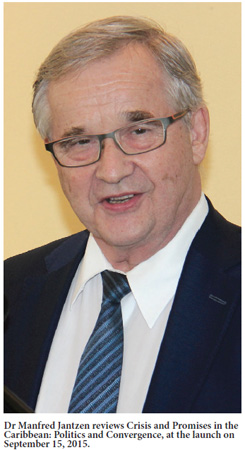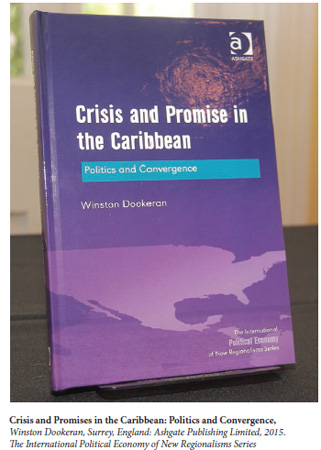|
October 2015

Issue Home >>
|

 Winston Dookeran in Crisis and Promises in the Caribbean, Politics of Convergence, encapsulates his life-long experience and deeply reflective thoughts as philosopher, strategist, politician and genuine solution leader. This book reflects the author’s multi-dimensional and interdisciplinary mindset dealing with such diverse yet interrelated fields as politics, economics and diplomacy in the context of a turbulent local, regional and global environment. Crisis and Promises in the Caribbean is about assessing the recent past, understanding the turbulent present and providing a pathway to the future of the Caribbean. Winston Dookeran in Crisis and Promises in the Caribbean, Politics of Convergence, encapsulates his life-long experience and deeply reflective thoughts as philosopher, strategist, politician and genuine solution leader. This book reflects the author’s multi-dimensional and interdisciplinary mindset dealing with such diverse yet interrelated fields as politics, economics and diplomacy in the context of a turbulent local, regional and global environment. Crisis and Promises in the Caribbean is about assessing the recent past, understanding the turbulent present and providing a pathway to the future of the Caribbean.
I have had the privilege of knowing Dookeran for over 20 years and working with him closely for the last ten years. I can attest that the content of this book also reflects his core values, deep insights and I believe that this book is not just an academic exercise but a testament to his unwavering belief in the goodness of human nature. He firmly believes in the future of the nations of the Caribbean to achieve their rightful place in the international fora of the world.
The book is based on the many presentations to conferences in the author’s capacity as Governor of the Central Bank, Finance Minister and Foreign Affairs Minister of Trinidad & Tobago. It is also the continuation and evolution of his thoughts as expressed in two previous books: Leadership and Governance of Small States: Getting Development Right (Dookeran & Malaki, 2008) and Power Politics and Performance: A Partnership Approach for Development (Dookeran & Jantzen, 2012).
Crisis and Promises is in three parts (with a total of 15 chapters): “New Politics: A Democratic Society,” “Inclusive Development: Sustainable Growth,” and “Caribbean Convergence: Integration without Borders.”
In the four chapters of Part I, “New Politics: A Democratic Society,” the author challenges societal leaders to question the old political assumptions and build the foundations for a new democratic societal order. Chapter 1, “The Old Politics” exposes the shortcomings of a political system that continues to thrive on that which divides rather than that which unites. Dookeran stresses the need for an idea-based party that puts ‘country first.’ Chapter 2, “The New Leadership” speaks to the new political leadership requiring politicians to have both a philosophical and strategic mindset when developing an idea-based party. Chapter 3, “The New Role of the State” advocates building a nation from the bottom up, from a community-based democratic infrastructure connected to central authorities through transformed local government. This demands devolution of authority and resources from central government. Chapter 4, “Towards True Democracy” explores specific political, electoral and constitutional reforms.
The five chapters of Part II, Inclusive Development: Sustainable Growth, take a political economy perspective. As a developmental economist by training, in Chapter 5, “Political Economy of Development,” Dookeran examines international models of economic development (Nordic/European, East Asian and Pacific, Transitional Economies, African, Latin American and the Caribbean and Middle East and North Africa). He highlights critical departures from current economic strategies and recognizes that stable politics promotes economic development.
In Chapter 6, “Synchronizing the Logic of Politics and Economics,” the author explores the interplay between economics, law and politics; he states that if politics and economics are inseparable, then politics without economics is disastrous. He reinforces the ‘third way’ philosophy with the understanding that the right policies will determine the right outcomes and that realizing the growth potential of a society requires closing the gaps in social equity.
Chapter 7, “Addressing Inequality,” deals with the social dimensions of development by focusing on the inequalities related to poverty and issues of income distribution. The author explores the troubling question why despite rapid growth many developing countries have not seen the overall benefit to society.
Chapter 8, “Financing Development,” addresses the challenge of the ability to pay for development – financing development through government spending and borrowing. The author identifies key strategies to protect and stimulate the economy to improve competitiveness of the key financial institutions. This includes the development of private-public partnerships and forward looking public policies. Chapter 9, “Drilling Down for Development,” continues the theme of reform and public institutional transformation urging a ‘drilling down for development’ focus on public policy and pension reform. For small island developing states (SIDS), growth must not only be transformational but must be endogenous.
The six chapters of Part III, “Caribbean Convergence: Integration without Border,” shift the focus from individual country development to Caribbean development in the context of the global environment. In Chapter 10, “The Caribbean Integration of Yesteryear,” the author provides a historical perspective on the early attempts of Caribbean integration and why it failed and emphasizes a ‘rethinking of the centre periphery’ approach of the past. Chapter 11, “Trade and Foreign Policy in Concentric Circle,” links the previous chapter and argues that the new integrationist is more concerned about inserting the country’s economy into the international economy rather than regional one. Therefore, there is an emphasis on connectivity and convergence of integrative processes.
In Chapter 12, “Measuring Sustainability,” Dookeran urges that the small states of the Caribbean must ‘drill down for development,’ insisting that development cannot be imported. It must be ‘home-grown’ and requires the unearthing of entrepreneurship, natural talents and capabilities of our people. We need new approaches and new models of development that are ‘customized’ to the Caribbean.
Chapter 13, “Caribbean Integration,” encourages open regionalism, getting rid of all the ‘artificial’ borders, creating a borderless Caribbean space as a means to achieve development in both economic growth and social equity simultaneously. Dookeran prescribes ways to position the diverse economies of Caribbean states into the global economy. He promotes ‘clusters and hubs’ of economic cooperation and synergies to meet the challenges of the global competitive markets. He reiterates the need for regional blocs to operate and negotiate as economic units (not political) so as to obtain reciprocal benefits. If SIDS and the global south is to have equitable voice and relationship in the global economic affairs there is need for them to assume critical positions and exercise political power within the existing institutional architecture.
 Chapter 14, “A New Frontier for Caribbean Convergence,” Dookeran asserts that the ‘old integration approach’ through CARICOM, in its present state, has reached its limits. Dookeran proposes that the way forward for integration is to move from a political strategy to an economic one by rekindling it through a new process of Caribbean convergence. He defines the necessary steps to create the “Economy of the Caribbean Sea,” create a new Caribbean space. Chapter 14, “A New Frontier for Caribbean Convergence,” Dookeran asserts that the ‘old integration approach’ through CARICOM, in its present state, has reached its limits. Dookeran proposes that the way forward for integration is to move from a political strategy to an economic one by rekindling it through a new process of Caribbean convergence. He defines the necessary steps to create the “Economy of the Caribbean Sea,” create a new Caribbean space.
Chapter 15, “The Challenge for Tomorrow’s Leaders” is precisely that leaders must “embrace this New Caribbean Space.” A new solution leadership capable of rethinking the old paradigms must boldly move into the new frontier. It is a shift from ‘place’ to ‘space,’ from the limits imposed by physical geography, like ‘national borders,’ to the nearly ‘unlimited’ ‘borderless’ space created by the flow of information. Here the challenge is how to converge and integrate without recognizable borders. The borders of a country and the Caribbean are only defined by the network or web of relationship created and managed to maintain.
Dookeran’s most significant contribution of this idea-filled book is the conceptual framework of Convergence without Borders. Alfonso Munerva, Secretary General, Association of Caribbean States says that he has “witnessed the evolution of the concept of ‘Convergence without Borders’ which is so thoroughly expounded in this book. I am convinced that said concept constitutes a powerful theoretical tool to foster bold transformations which are necessary for the emergence and development of a new political and economic vision in the context of integration among Caribbean peoples.”
The time has come for a new leadership, a solution leadership. The thoughts expressed by Winston Dookeran in this book can serve as a guide for anyone seeking solutions to the challenges of adaptation in today’s dynamic global, regional and local environment. All chapters are rich sources for further research and inclusion of quantitative support and analysis. Crisis and Promises with its new ideas, approaches is a valuable resource for students, academics, policy makers and practitioners – for all those who search for a new paradigm for Caribbean inclusive and equitable societal development.
Manfred Jantzen, PhD, is Director of Dissertation Research, at the Arthur Lok Jack Graduate School of Business, The UWI. |





